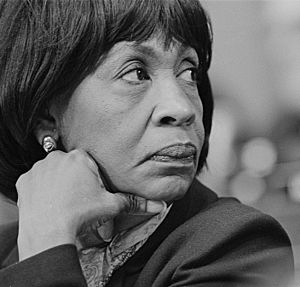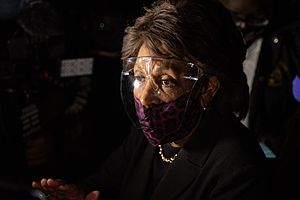Maxine Waters facts for kids
Quick facts for kids
Maxine Waters
|
|
|---|---|
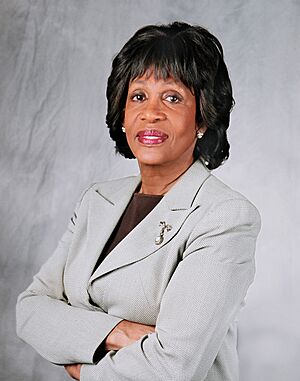
Official portrait, 2012
|
|
| Ranking Member of the House Financial Services Committee | |
| Assumed office January 3, 2023 |
|
| Preceded by | Patrick McHenry |
| In office January 3, 2013 – January 3, 2019 |
|
| Preceded by | Barney Frank |
| Succeeded by | Patrick McHenry |
| Chair of the House Financial Services Committee | |
| In office January 3, 2019 – January 3, 2023 |
|
| Preceded by | Jeb Hensarling |
| Succeeded by | Patrick McHenry |
| Chair of the Congressional Black Caucus | |
| In office January 3, 1997 – January 3, 1999 |
|
| Preceded by | Donald M. Payne |
| Succeeded by | Jim Clyburn |
| Member of the U.S. House of Representatives from California |
|
| Assumed office January 3, 1991 |
|
| Preceded by | Augustus Hawkins |
| Constituency | 29th district (1991–1993) 35th district (1993–2013) 43rd district (2013–present) |
| Member of the California State Assembly from the 48th district |
|
| In office December 6, 1976 – November 30, 1990 |
|
| Preceded by | Leon D. Ralph |
| Succeeded by | Marguerite Archie-Hudson |
| Personal details | |
| Born |
Maxine Moore Carr
August 15, 1938 St. Louis, Missouri, U.S. |
| Political party | Democratic |
| Spouses |
|
| Children | 2 |
| Education | California State University, Los Angeles (BA) |
| Signature | |
Maxine Moore Waters (born August 15, 1938) is an American politician. She has served as a U.S. Representative for California since 1991. Her district includes parts of southern Los Angeles and nearby cities like Inglewood and Torrance.
As a member of the Democratic Party, Waters has been elected to the House of Representatives many times. She is the most senior of the Black women serving in Congress. From 1997 to 1999, she was the leader of the Congressional Black Caucus, a group of African American members of Congress. She is also one of the most senior politicians from California in Congress, after Nancy Pelosi.
Before serving in Congress, Waters was a member of the California State Assembly. There, she fought against apartheid, an unfair system of racial segregation in South Africa. In Congress, she was known for opposing the Iraq War. She has also been a strong critic of several U.S. presidents, including George H. W. Bush, Bill Clinton, George W. Bush, Barack Obama, and Donald Trump.
In 2018, Time magazine named Waters one of the 100 most influential people in the world.
Contents
Early Life and Education
Maxine Waters was born in 1938 in St. Louis, Missouri. She was the fifth of 13 children. Her mother raised her and her siblings alone after her father left when she was two. In 1961, her family moved to Los Angeles.
In Los Angeles, she worked in a clothing factory and as a telephone operator. In 1966, she became an assistant teacher for the Head Start program, which helps young children from low-income families. Later, she went to college at California State University, Los Angeles and earned a degree in sociology in 1971.
Early Political Career
Waters started her political career in 1973 as a top aide for a Los Angeles City Councilman. In 1976, she was elected to the California State Assembly.
In the Assembly, she worked to stop California from investing money in businesses connected to South Africa. At the time, South Africa had a system called apartheid, which was very unjust to Black people. Waters's work helped pass laws to support this cause. She became a leader in the Assembly as the Democratic Caucus Chair.
U.S. House of Representatives
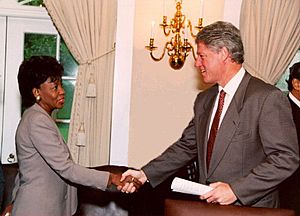
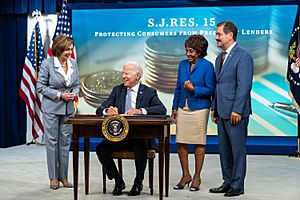
In 1990, Waters was elected to the United States House of Representatives. She won with over 79% of the vote. She has been reelected many times since then, usually with more than 70% of the vote.
Her district covers a large part of south-central Los Angeles and several nearby cities.
Work in Congress
Waters is known for being an outspoken and strong voice in Congress. From 1997 to 1998, she was the leader of the Congressional Black Caucus.
In 2008, she supported Hillary Clinton for president during the Democratic primaries. She later switched her support to Barack Obama when he became the clear front-runner.
In 2011, Waters voted against a defense bill. She was concerned about a part of the bill that could allow the government to hold American citizens in jail without a trial.
After Representative Barney Frank retired in 2012, Waters became the top Democrat on the powerful House Financial Services Committee. This committee oversees the nation's banks, housing, and economy. She served as the committee's chair from 2019 to 2023.
"Reclaiming my time"
In 2017, a video of Waters went viral. During a committee meeting, she was questioning the Secretary of the Treasury, Steven Mnuchin. When she felt he was not answering her questions directly, she repeatedly said, "reclaiming my time." This is a phrase used in Congress to get back the time a speaker has been given. The phrase became a popular slogan for her supporters.
Stance on Presidents
George H. W. Bush
In 1992, Waters called President George H. W. Bush a "racist." She believed he used race to divide people and advance his political goals.
Barack Obama
Although she supported him, Waters also criticized President Barack Obama. In 2011, she said he was not doing enough to help the Black community, where unemployment was very high. She said that many Black leaders were afraid to criticize Obama because he was so popular.
Donald Trump
Waters was one of the earliest and strongest critics of President Donald Trump. Soon after he took office in 2017, she began calling for his impeachment. She often called him "dangerous" and "divisive."
After a white nationalist rally in Charlottesville, Virginia, in 2017, she said the White House had become the "White Supremacists' House." Trump responded by calling her a "low-IQ individual." Waters voted to impeach Trump in both 2019 and 2021.
Notable Events
Los Angeles Riots
In 1992, riots broke out in Los Angeles after the verdict in the Rodney King case. Waters gained national attention during this time. She called the events a "rebellion" against injustice, not just a riot. She said the anger was "understandable, if not acceptable." She also helped deliver food and supplies to people in the affected neighborhoods.
Comments on Protests
In April 2021, Waters attended protests in Minnesota over the killing of Daunte Wright. She was also there during the trial of Derek Chauvin, the police officer charged with murdering George Floyd. She told protesters they needed to "get more confrontational" to make sure their voices were heard.
Some people, mostly Republicans, said her words encouraged violence. The judge in the Chauvin trial called her comments "disrespectful to the rule of law." However, he did not declare a mistrial. House Republicans tried to formally censure (disapprove of) her, but the vote failed. Waters said her words were about confronting the justice system through nonviolent action and new laws.
Bombing Attempt
In October 2018, packages containing pipe bombs were sent to two of Waters's offices. The packages were found before they could cause any harm. Similar packages were sent to other Democratic leaders. A man was later arrested and sentenced to 20 years in prison for mailing the bombs.
Personal Life
Waters is married to Sid Williams, who was a professional football player and later a U.S. ambassador. They live in Los Angeles.
In May 2020, during the COVID-19 pandemic, Waters announced that her sister had died from the virus.
See also
- List of African-American United States representatives
- Women in the United States House of Representatives
 | George Robert Carruthers |
 | Patricia Bath |
 | Jan Ernst Matzeliger |
 | Alexander Miles |


